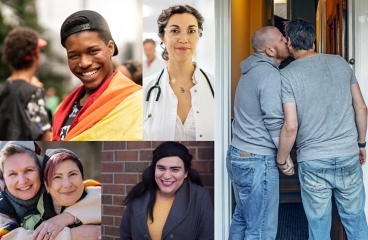
How can you get the best care?
You deserve the best health care you can find. When you find a healthcare provider who makes you feel comfortable and safe, you're more likely to go see them when you need to. You're also more likely to get care that focuses on you as a whole person.
Here are some tips to help you get the best care.
- Set yourself up for success.
Before you make an appointment:
- Check clinic websites. They may state that they're 2SLGBTQI+ friendly.
- Read healthcare provider reviews and profiles online. They can help you get a sense of how comfortable you'd feel with a particular healthcare provider or counsellor. Ask others in your community for recommendations.
Think about checking out a local sexual health clinic. Sexual health clinics are welcoming places to get wellness examinations, preventive screenings, tests for sexually transmitted infections (STIs), birth control, condoms, and family planning information.
If you get nervous in a health care setting, you might try repeating a positive affirmation like "I deserve good care."
- Get support.
Consider bringing your partner, a friend or family member to appointments. They may be able to help you stay relaxed, ask questions, or take notes.
- Find the right healthcare provider.
If you don't feel like you can be open and comfortable, look elsewhere. You shouldn't have to hide or downplay your relationships or who you are. And you shouldn't feel judged. It's okay to try out different healthcare providers. And it's okay to ask lots of questions. For tips on talking to your healthcare provider, go to AHS.ca/lgbtq2s.
If you are having trouble finding an inclusive healthcare provider, there are some things you can do:
- Contact your local pride or 2SLGBTQI+ community resource centre.
- Call Health Link at 811.
- Go to the College of Physicians and Surgeons of Alberta website at cpsa.ca. You can list LGBTQ as an area of interest and search for 2SLGBTQI+ inclusive doctors who are accepting new patients.
What do you need to know about health screenings?
What screening tests you have depend on what body parts you have, your personal and family history, your age, and your sexual activity. And screening for certain cancers may depend on if you take hormones. Talk to your healthcare provider about what screenings you need.
- Experts recommend cervical cancer screenings for anyone age 25 and up who has a cervix.
- This may mean having a Pap test or a human papillomavirus (HPV) test, or both. How often you need these tests will depend on your age and health history. HPV can be passed among partners of any gender. And HPV increases your risk of getting cervical cancer.
- Sexually transmitted infections (STIs) are a concern for everyone who is sexually active.
- Talk with your healthcare provider about STI testing. They may ask questions about your current and past sexual activity to work out which test you need. You may also discuss options for safer sex. These include always cleaning your sex toys and using dental dams or condoms.
- Depression is more common in the 2SLGBTQI+ community because of the discrimination many 2SLGBTQI+ people face.
- So it's a good idea to check in with your healthcare provider if you're feeling down. Treatment for depression can help people feel better each day. And it can help people take better care of themselves so that they lead the healthiest lives possible.
Your healthcare provider can help you figure out what other screenings you may need. These may include screenings for cholesterol, diabetes, or certain cancers, like breast, prostate, and colorectal cancer.
Along with getting screenings, you and your healthcare provider can also discuss ways to do more of the things that help keep you healthy in general. These include things like being active, eating healthy foods, and spending time with others.
How can stress affect your health?
For many reasons, including discrimination and lack of access to supports, 2SLGBTQI+ people may have extra stress.
If you move through life with added stress, it can affect your health and how you feel day to day. For example, you may:
- Feel anxious, moody, or depressed.
- Be more likely to have headaches, an upset stomach, back pain, or trouble sleeping.
- Get sick more often.
One key to managing extra stress is to get better at recognizing when and how you feel it. In your back? In your sleep? It's even more important to find out what helps you feel better. A hot shower? Stretching? Calling a friend?
If you're in tune with how you feel and why, and if you have some tools to feel better, you'll be more likely to make healthy choices. And you'll be less likely to turn to things like alcohol, drugs, or disordered eating.
Having a strong support or social network can also be a great way to lower stress. Connecting with others can help people feel better and live longer. Support networks can also help you explore ways to leave or change stressful situations to improve your well-being.
